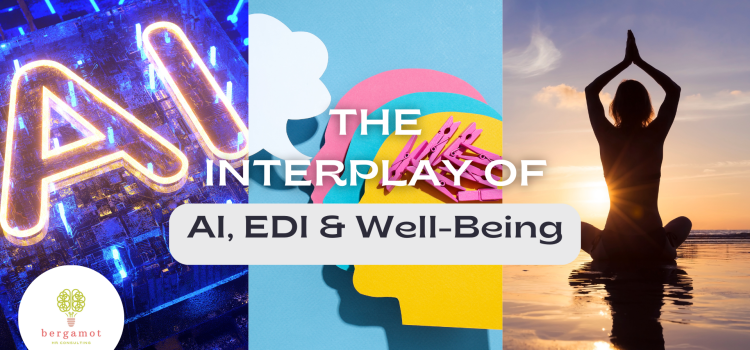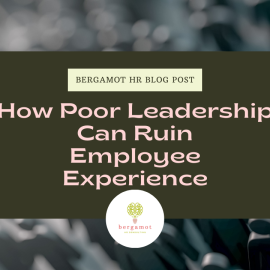
In the ever-evolving HR landscape, three hot topics have struck me as critical areas of focus: the use of generative AI in the workplace, equality, diversity, and inclusion (EDI), and employee well-being. Each have their own implications to consider, but nothing exists in isolation, and in the world of HR and organisations, these are three elements of a complex, interconnected system. I have been thinking about the synergies between these three topics. I have briefly explored them, highlighting their implications for both employers and employees and how they mutually influence and reinforce one another to support driving workplace success.
Generative AI in the Workplace
Generative AI, with its ability to create and innovate, driving workplace success, has gained significant attention in the HR world. Here’s an overview of its implications:
1. Enhanced Efficiency and Productivity: Generative AI can automate repetitive tasks, freeing up employees’ time for more strategic and creative endeavors. This can lead to increased productivity and efficiency within the workplace.
2. Ethical Considerations: Employers must navigate the ethical implications of AI, ensuring transparency, fairness, and accountability in its use. It is crucial to address concerns related to bias, privacy, and the impact on job roles and security.
3. Upskilling and Reskilling: As AI takes over certain tasks, employers must focus on upskilling and reskilling employees to adapt to new roles and responsibilities. This promotes continuous learning and growth, driving employee engagement and retention.
Equality, Diversity, and Inclusion
EDI has become a central focus for organisations striving to create inclusive and equitable workplaces, driving workplace success. Consider the following implications:
1. Enhanced Innovation and Performance: Embracing diversity and fostering an inclusive culture can lead to increased innovation, creativity, and problem-solving. Diverse perspectives and experiences contribute to better decision-making and overall organisational performance.
2. Attracting and Retaining Talent: Organisations that prioritise EDI are more likely to attract and retain top talent. Employees seek workplaces that value and respect their unique identities, fostering a sense of belonging and engagement.
3. Mitigating Bias and Discrimination: Employers must actively address unconscious bias and discrimination within their processes, policies, and practices. This includes promoting fair hiring practices, providing equal opportunities for growth, and creating a safe and inclusive work environment.
Employee Well-being
Employee well-being encompasses physical, mental, and financial aspects, all of which significantly impact engagement and productivity. Consider the following implications:
1. Physical Well-being: Employers should prioritise employee health and safety, providing resources and support for physical wellness initiatives. This includes promoting work-life balance, ergonomic workspaces, and wellness programs.
2. Mental Well-being: Organisations must address mental health concerns by fostering a supportive and stigma-free environment. Offering mental health resources, promoting work-life balance, and encouraging open communication can enhance employee well-being.
3. Financial Well-being: Employers can support employees’ financial well-being through fair compensation, benefits packages, and financial education programs. This reduces financial stress and enhances overall job satisfaction.
Driving Workplace Success Through The Synergies of the Three Topics
Generative AI and Equality, Diversity, Inclusion
Generative AI has the potential to either reinforce or challenge existing inequalities and biases within organisations. It is essential for employers to proactively address these issues to ensure that AI systems are developed and deployed in a fair and inclusive manner. Consider the following aspects of their interconnectedness:
a. Bias Mitigation: AI systems are only as unbiased as the data they are trained on. If the training data is biased, the AI algorithms can perpetuate and amplify existing inequalities. Employers must carefully curate and diversify training data to mitigate bias and ensure equitable outcomes.
b. Fair Decision-Making: AI-driven decision-making processes, such as recruitment or performance evaluations, must be transparent and accountable. Employers should regularly assess and audit AI systems to identify and rectify any biases that may emerge.
c. Inclusive AI Development: Promoting diversity and inclusion within AI development teams can help mitigate biases and ensure that AI systems are designed to serve the needs of a diverse range of users. Diverse perspectives can uncover potential biases and contribute to the creation of more inclusive AI technologies.
d. Accessibility and Inclusivity: Employers should consider the accessibility of AI systems to ensure that they are usable by all employees, regardless of their abilities or backgrounds. This includes providing alternative interfaces, accommodating different learning styles, and addressing potential barriers to access.
Equality, Diversity, Inclusion, and Employee Well-being
Equality, diversity, and inclusion are closely intertwined with employee well-being. Organisations that prioritise EDI initiatives tend to create an environment that supports and enhances employee well-being. Consider the following ways in which these areas intersect:
a. Psychological Safety: An inclusive and diverse workplace fosters psychological safety, where employees feel comfortable being themselves, expressing their opinions, and taking risks. This sense of safety positively impacts employee well-being, reducing stress and promoting mental health.
b. Sense of Belonging: EDI initiatives create a sense of belonging for employees from diverse backgrounds. When individuals feel valued and included, their overall well-being improves, leading to increased job satisfaction and engagement.
c. Supportive Networks: A diverse and inclusive workplace encourages the formation of supportive networks and communities. These networks provide employees with emotional support, mentorship, and opportunities for growth, contributing to their overall well-being.
d. Reduced Discrimination and Bias: By actively addressing discrimination and bias, organisations create an environment where employees feel respected and valued. This reduces the negative impact of discrimination on employee well-being, promoting a healthier and more inclusive work environment.
Employee Well-being and Generative AI
Generative AI can have a significant impact on employee well-being by automating tasks, reducing workload, and providing personalised support. Consider the following ways in which AI and employee well-being intersect:
a. Workload Management: AI can automate repetitive and mundane tasks, freeing up employees’ time and reducing their workload. This allows employees to focus on more meaningful and fulfilling work, enhancing their overall well-being.
b. Personalised Support: AI-powered tools can provide personalised support and resources to employees, such as mental health apps, well-being trackers, or financial planning tools. These tools can help employees manage their well-being more effectively, promoting a healthier work-life balance.
c. Enhanced Efficiency: AI systems can streamline processes and improve efficiency, reducing stress and frustration for employees. When employees can accomplish their tasks more efficiently, it positively impacts their well-being and job satisfaction.
d. Skill Development: As AI takes over certain tasks, employees have the opportunity to upskill and reskill, preparing them for new roles and responsibilities. This continuous learning and growth contribute to employee well-being by fostering a sense of purpose and professional development.
Driving Workplace Success
The interconnectedness of generative AI, equality, diversity, inclusion, and employee well-being highlights the need for organisations to approach these topics holistically. By recognising and addressing the interplay between these areas, employers can create a work environment that promotes fairness, inclusivity, and employee well-being. Embracing generative AI ethically, prioritising EDI initiatives, and supporting employee well-being will support driving workplace success by contributing to a more equitable and fulfilling workplace for all.
Are you losing valuable time or sleep over HR worries?
Get in touch to arrange a no obligation chat to find out how I can help you



